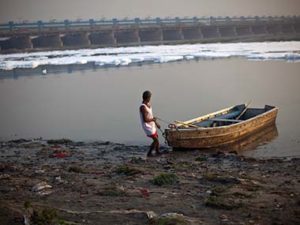The Supreme Court on Wednesday came down heavily on the Centre, the Delhi government and their civic bodies for not taking any step to tackle the “serious problem” of groundwater depletion in the national capital. The court observed that despiute having freshwater potential, the Yamuna was drying up.
“You are doing nothing to reduce water consumption, there is no plan for recharge and preservation of groundwater,” a bench of Justices Madan B Lokur and Deepak Gupta said. It asked the Center for immediate, intermediary and long term measures to check the depletion of Delhi’s groundwater
 The apex court, while observing that the authorities were just “passing the buck” and shying away from their responsibilities, also came down heavily on the Ministry of Water Resources for its affidavit saying a “school child” or a man on the street could also write an essay about the water problem in Delhi. “Have you seen the NITI Aayog report? It says that there will be no ground water in Delhi. There is pollution. Perhaps you will shift the capital. From where will groundwater come,” a bench comprising Justices Madan B Lokur and Deepak Gupta said. “Muhammad bin Tughluq was smart and 400 years ago, he had shifted the capital (from Delhi),” the bench said.
The apex court, while observing that the authorities were just “passing the buck” and shying away from their responsibilities, also came down heavily on the Ministry of Water Resources for its affidavit saying a “school child” or a man on the street could also write an essay about the water problem in Delhi. “Have you seen the NITI Aayog report? It says that there will be no ground water in Delhi. There is pollution. Perhaps you will shift the capital. From where will groundwater come,” a bench comprising Justices Madan B Lokur and Deepak Gupta said. “Muhammad bin Tughluq was smart and 400 years ago, he had shifted the capital (from Delhi),” the bench said.
ASG Nadkarni quoted a NITI Aayog report which stated that certain cities like Mumbai, Bengaluru, and Delhi will reach a zero groundwater situation by 2020. Reacting to this submission, Justice Lokur said, “By then, all the people in Delhi will already be dead because of no water.” Taking note of the problematic environmental and water situation faced by cities across the country, Justice Lokur rued, “Bombay is under water, Delhi has no water…there’s no water even in Shimla… your report says there is freshwater potential in Yamuna but there is no Yamuna left”, the Bar and Bench quoted Justice Lokur as saying.
Meanwhile, The Supreme Court also said there were flood-like situations in Mumbai, while there was no water in places like Shimla and nine percent rainfall deficiency in north India. “One place is dry and one place has floods. So, you will say that the average is good. What do you propose to do? Nothing. You are just passing the buck,” the court said.








